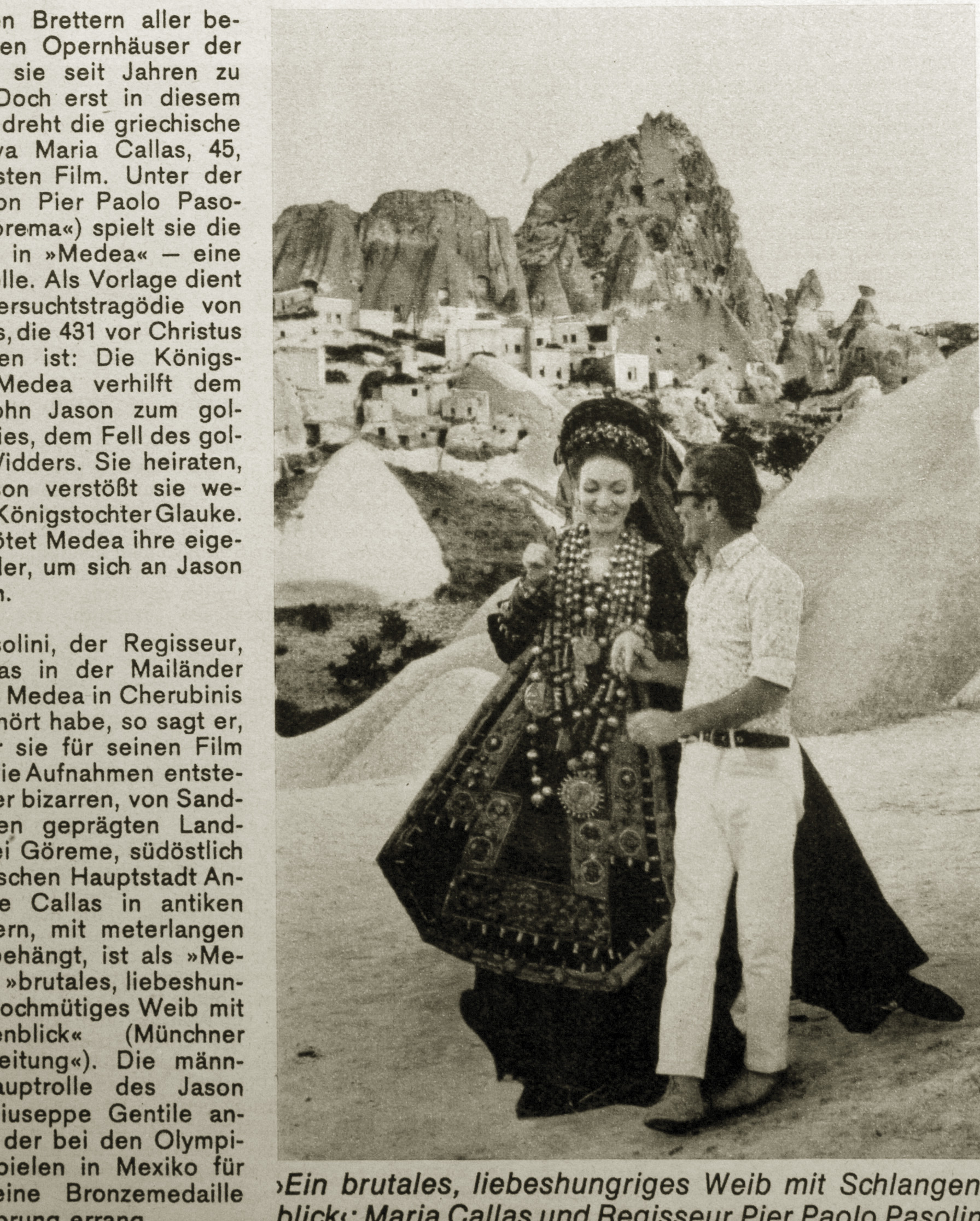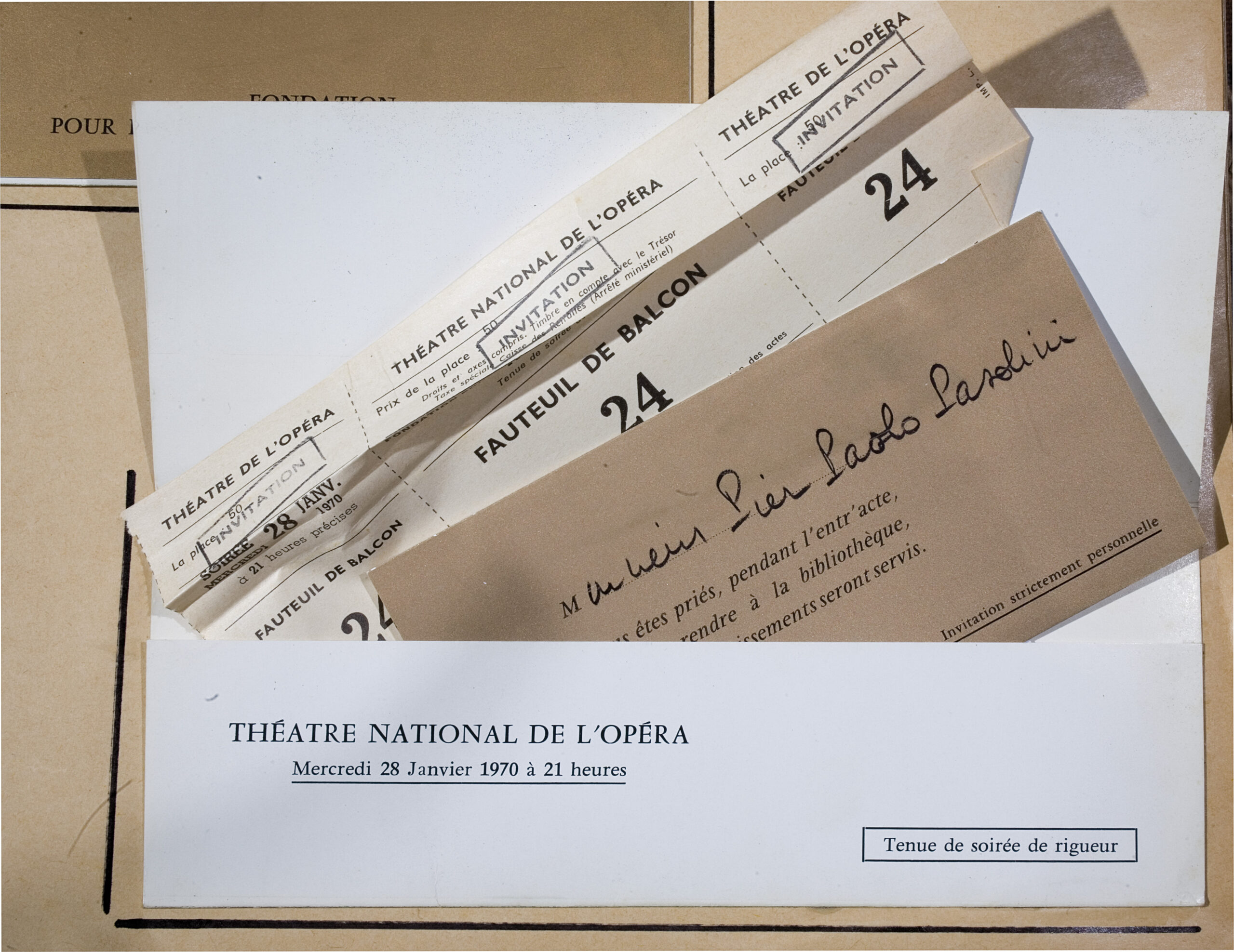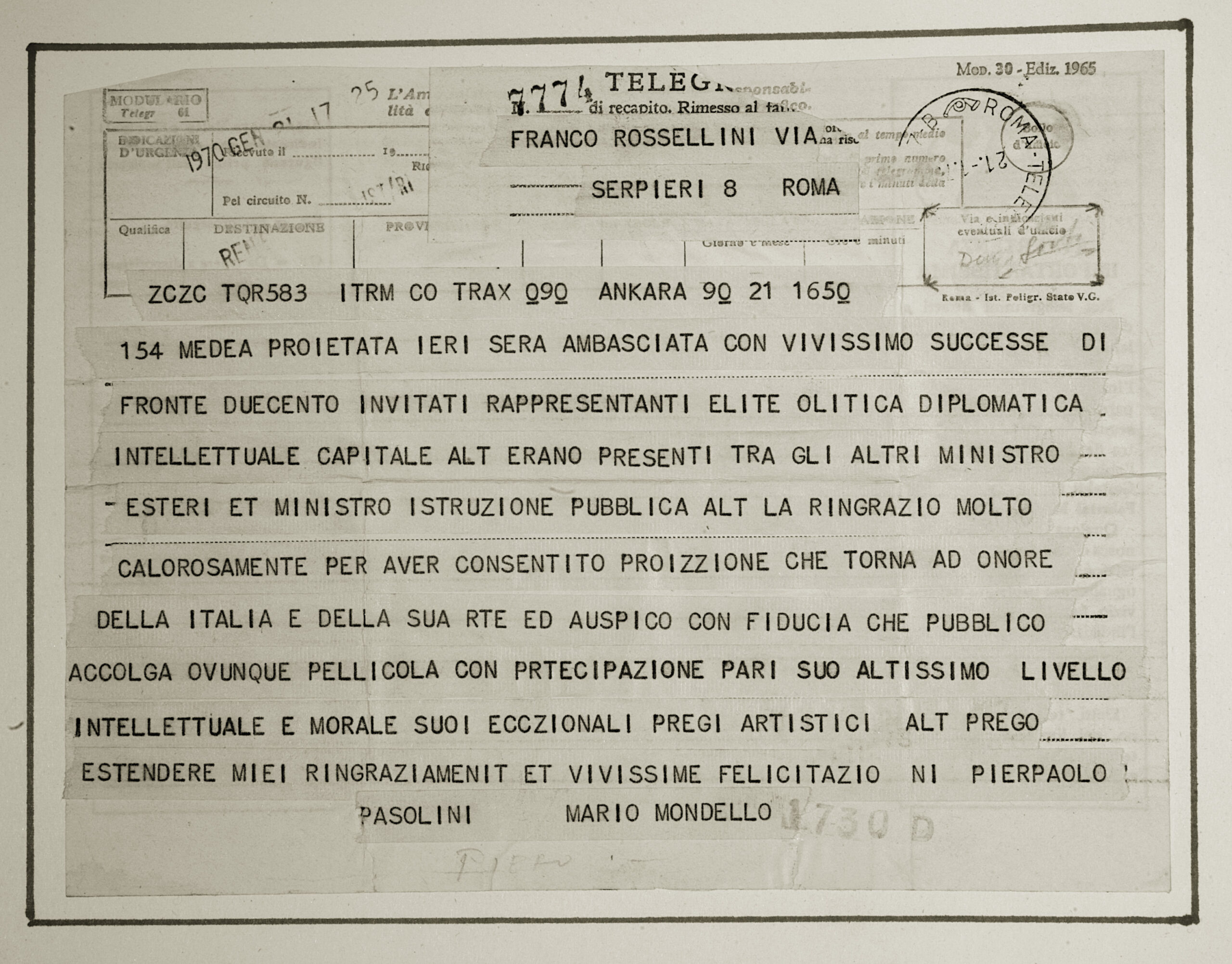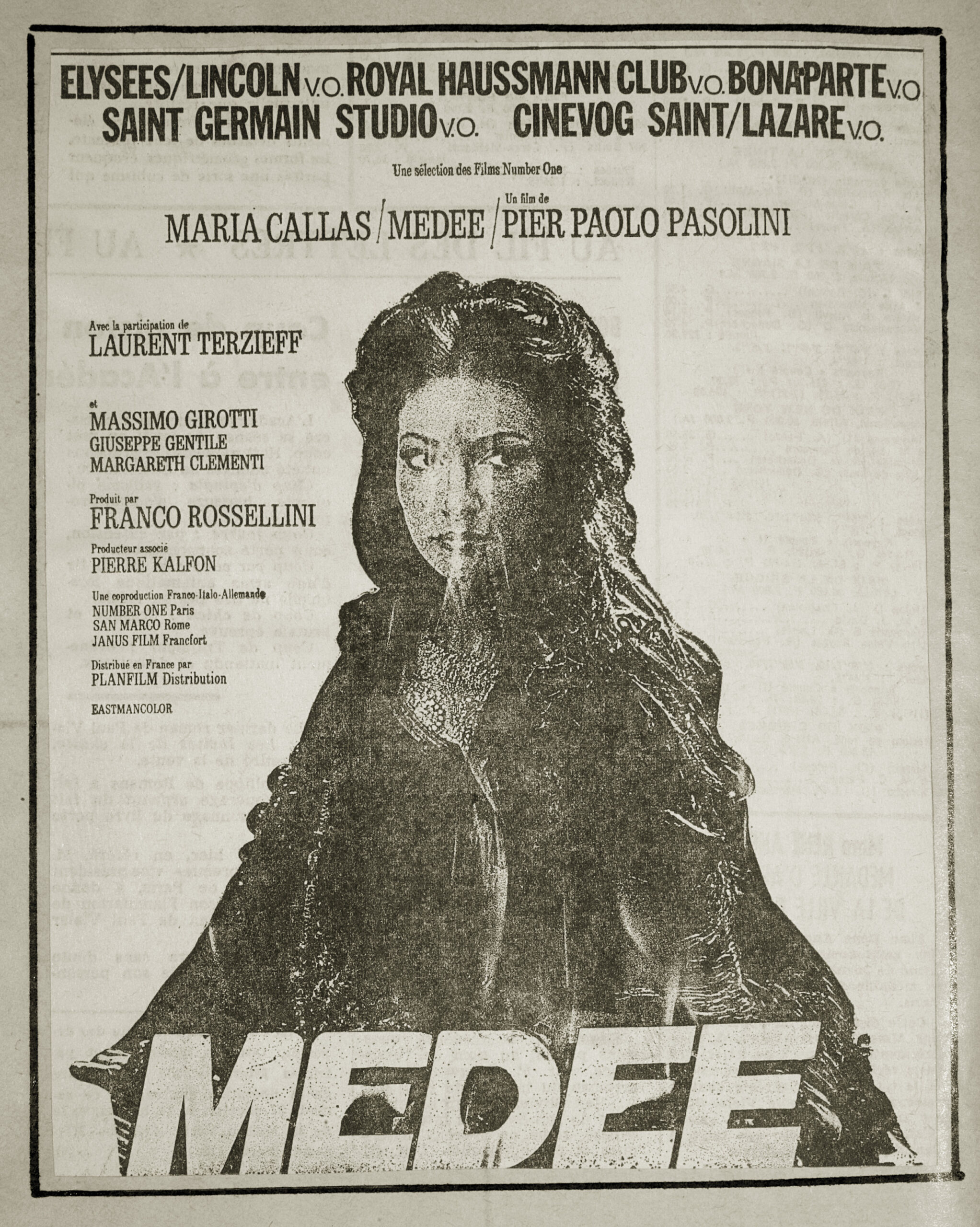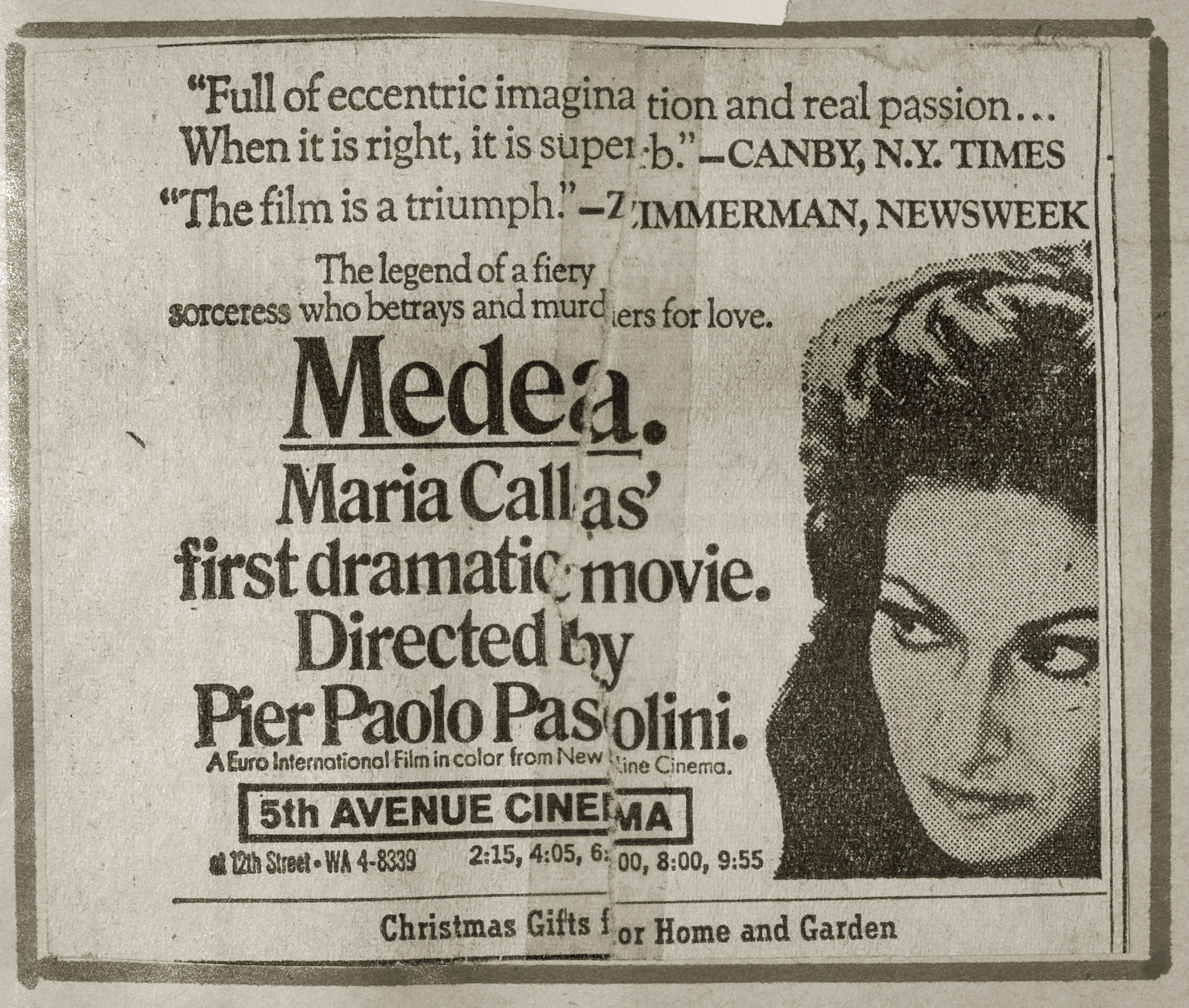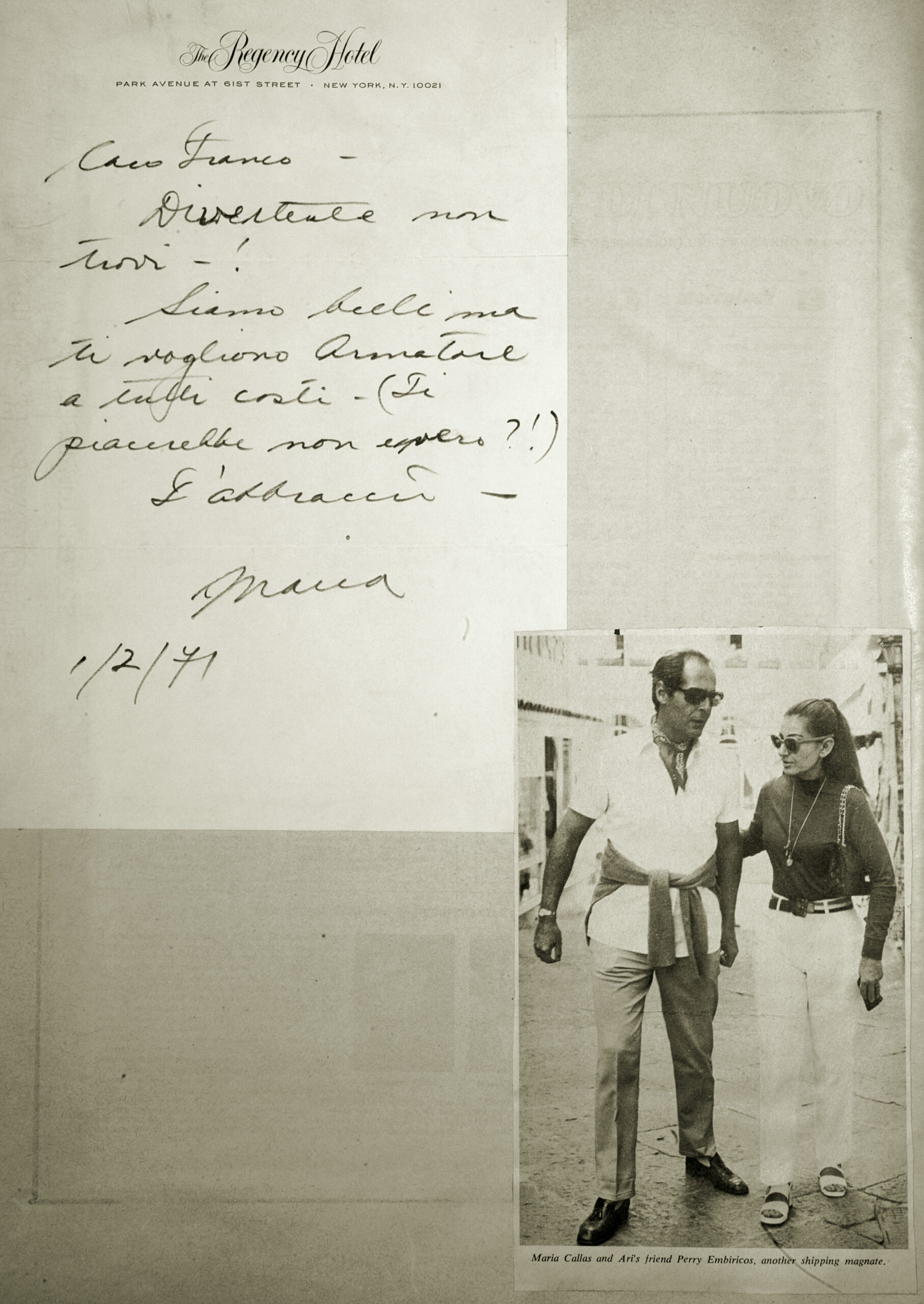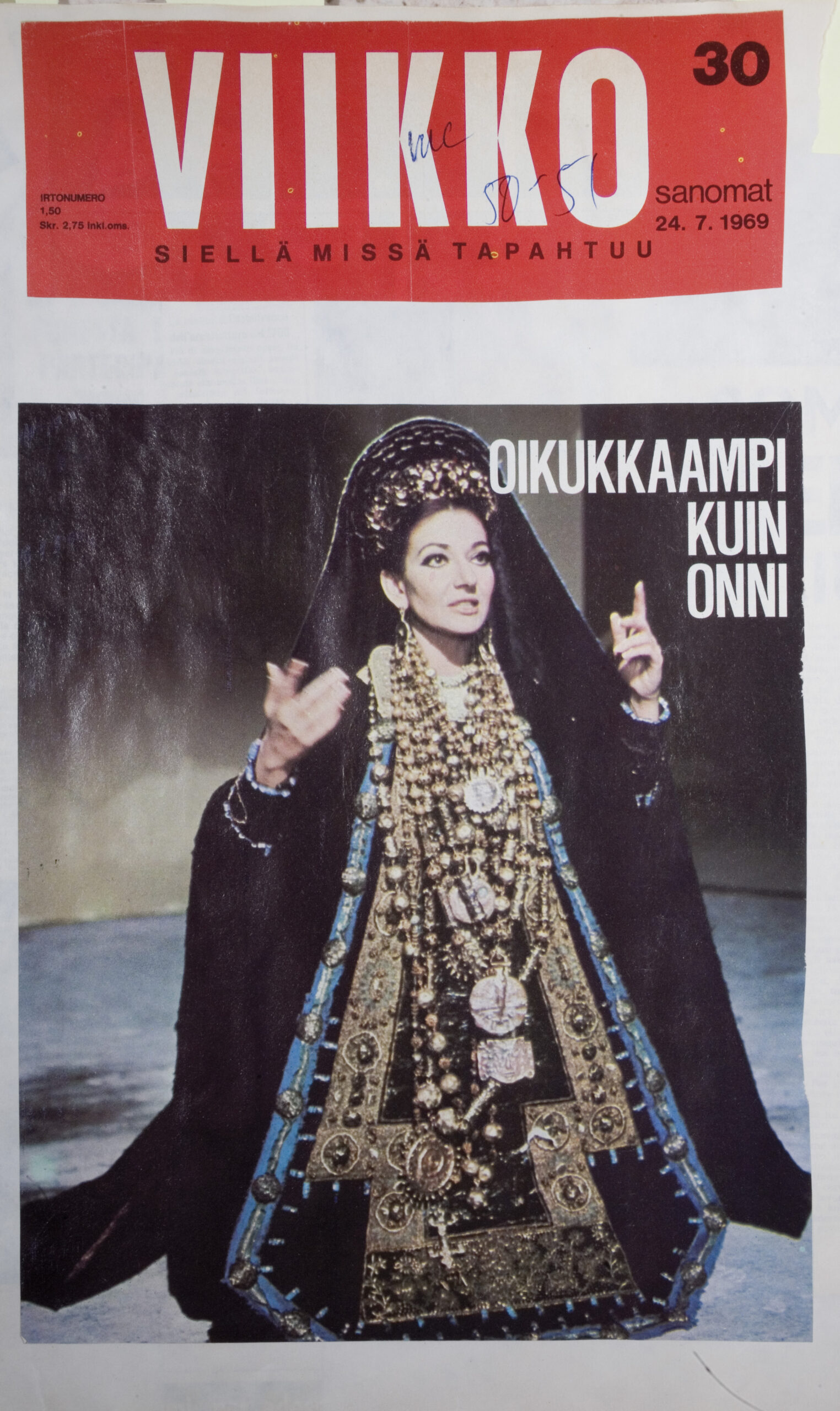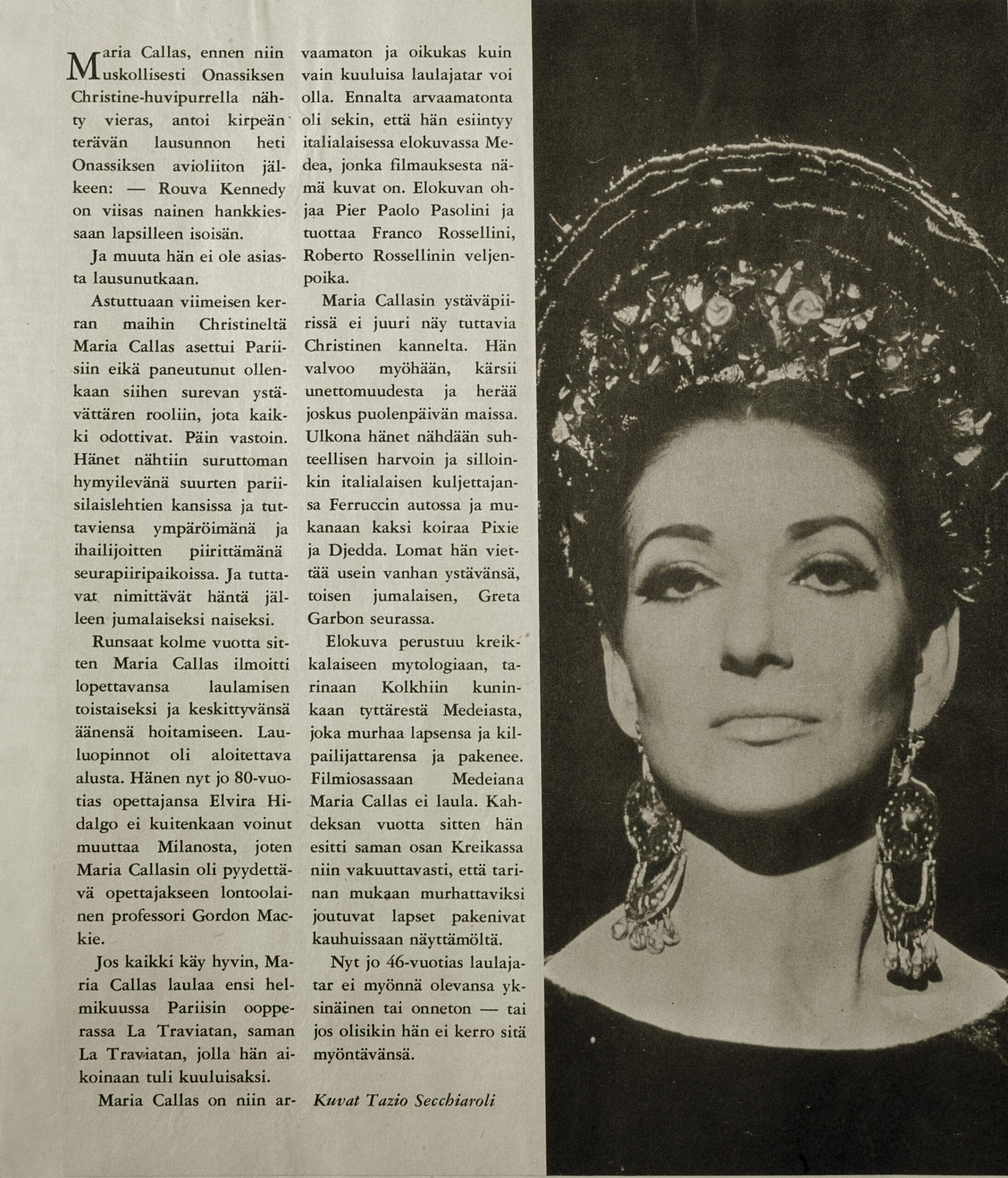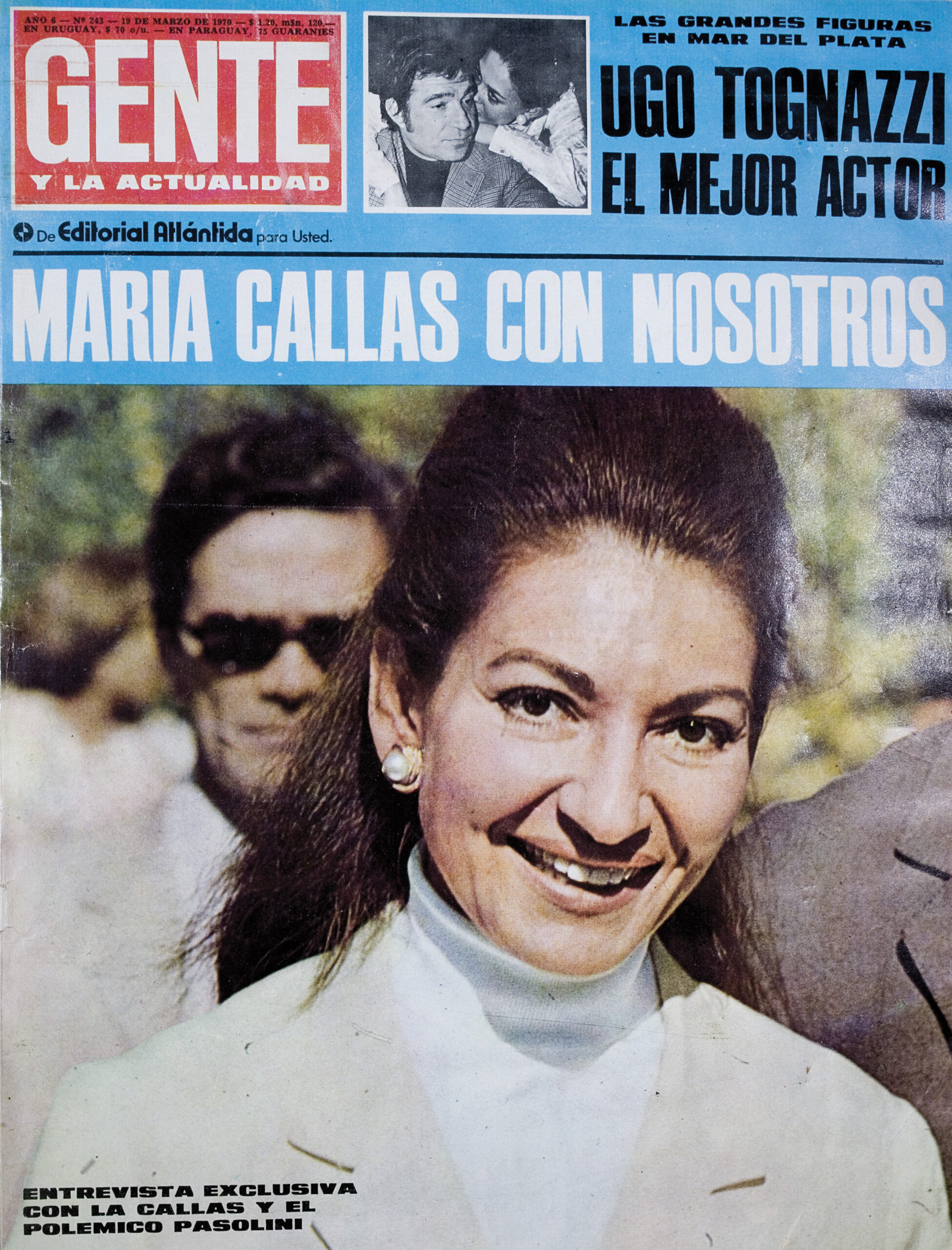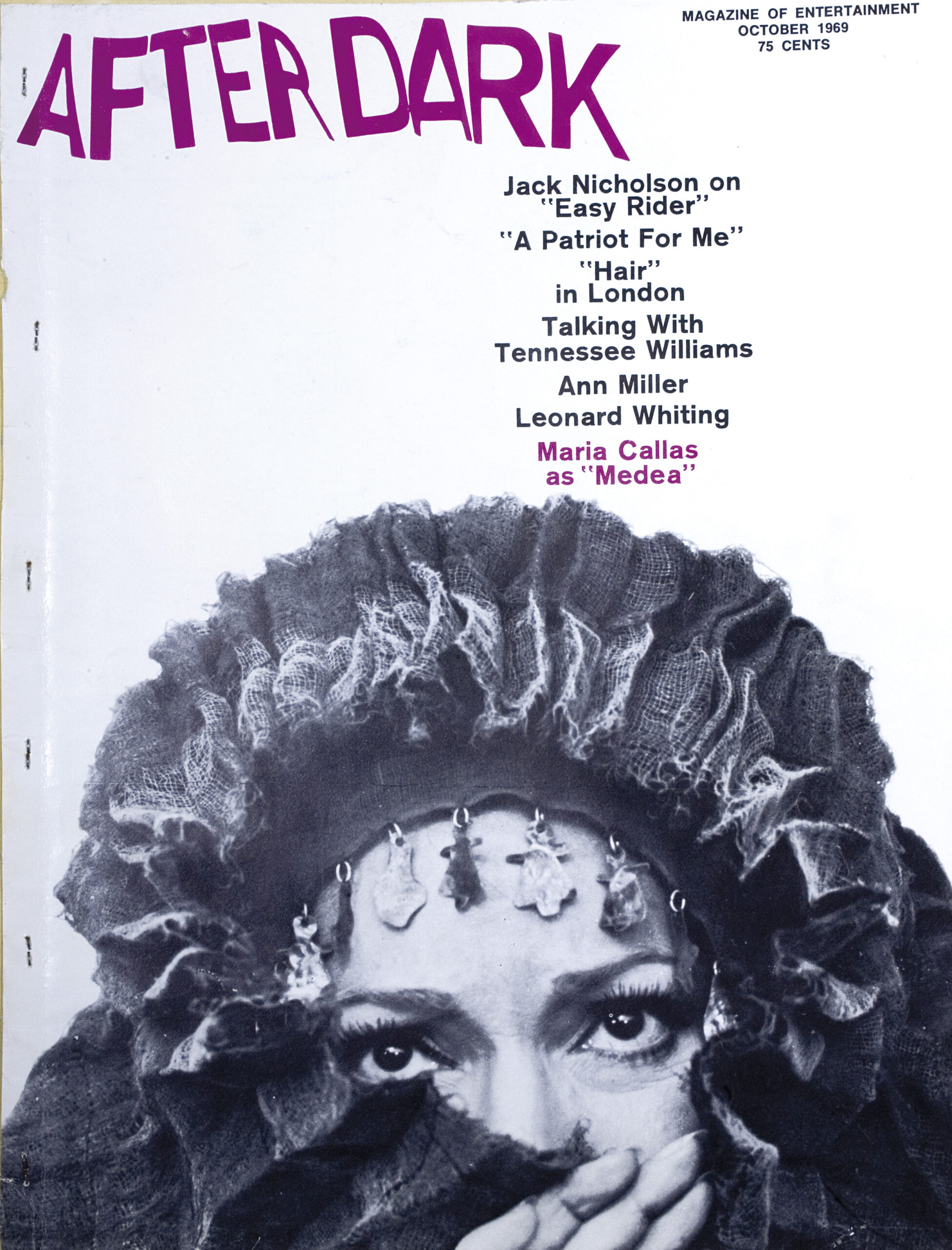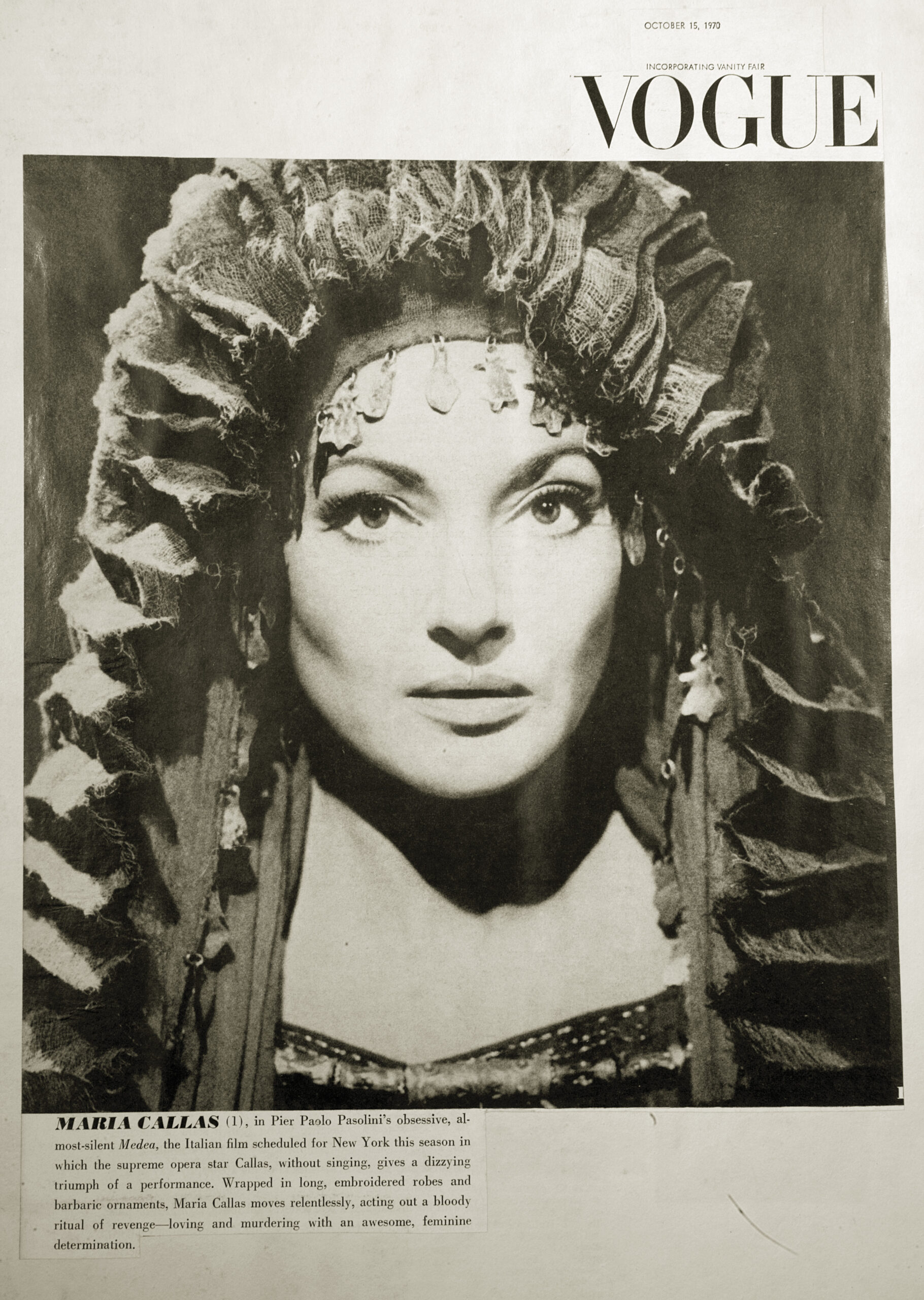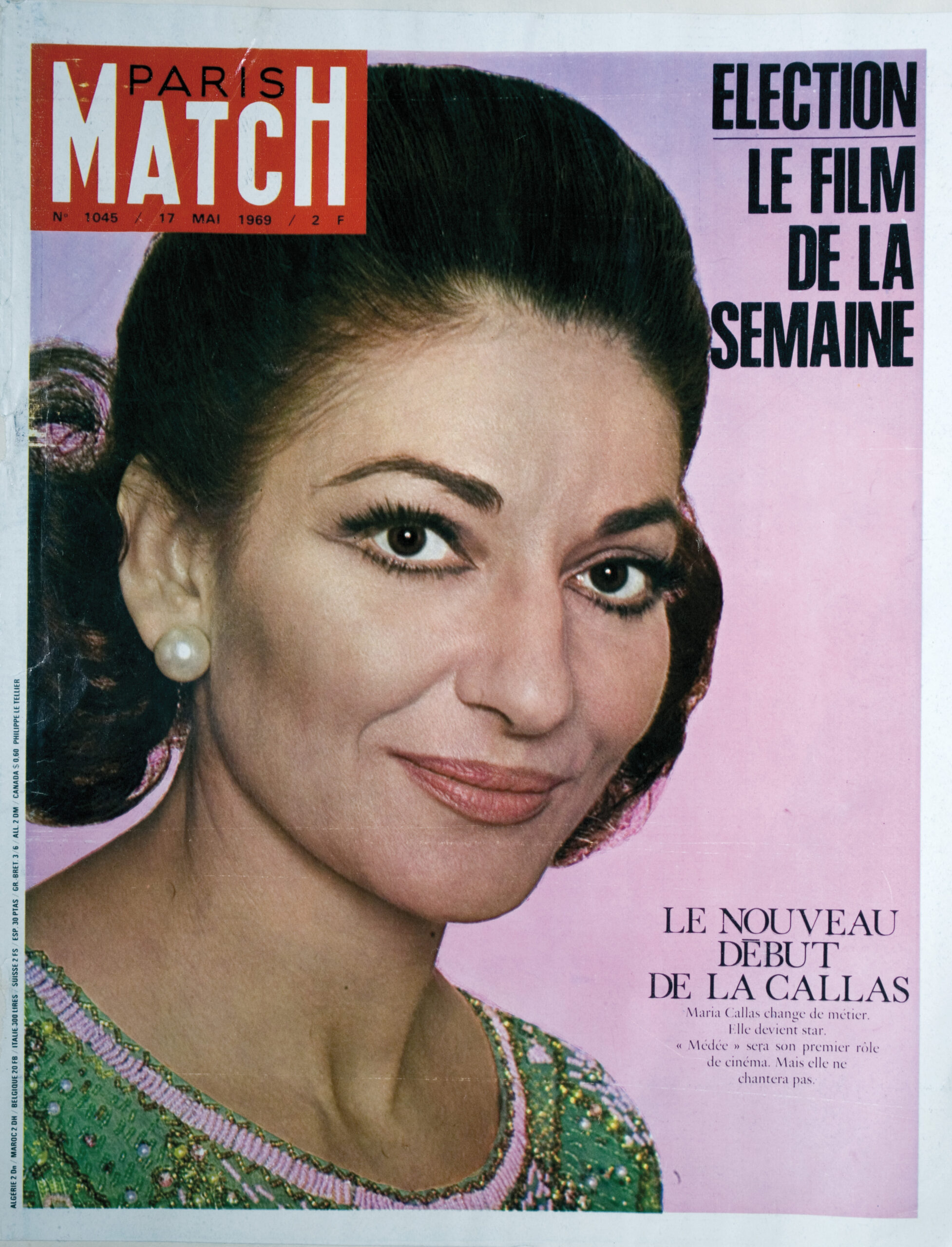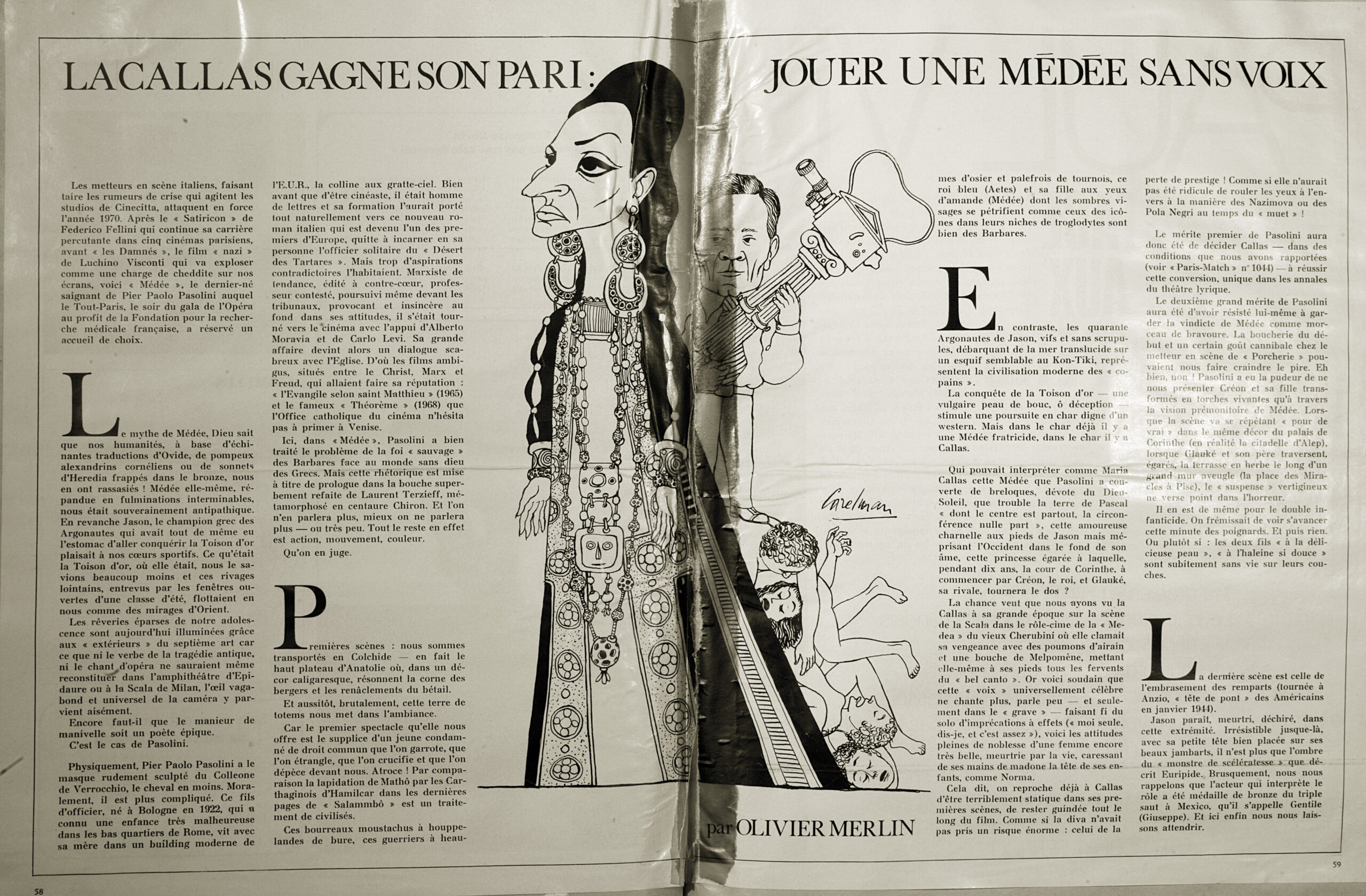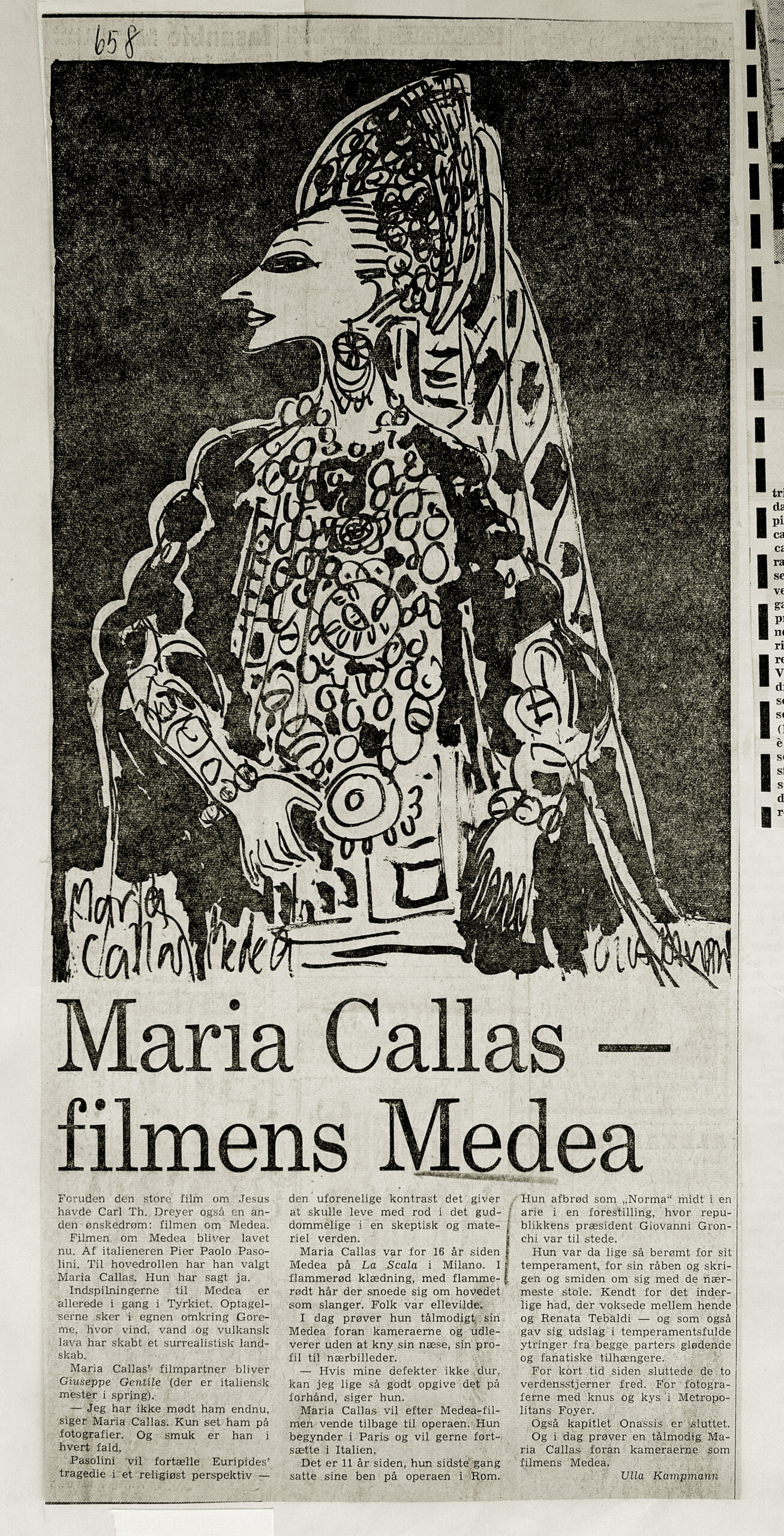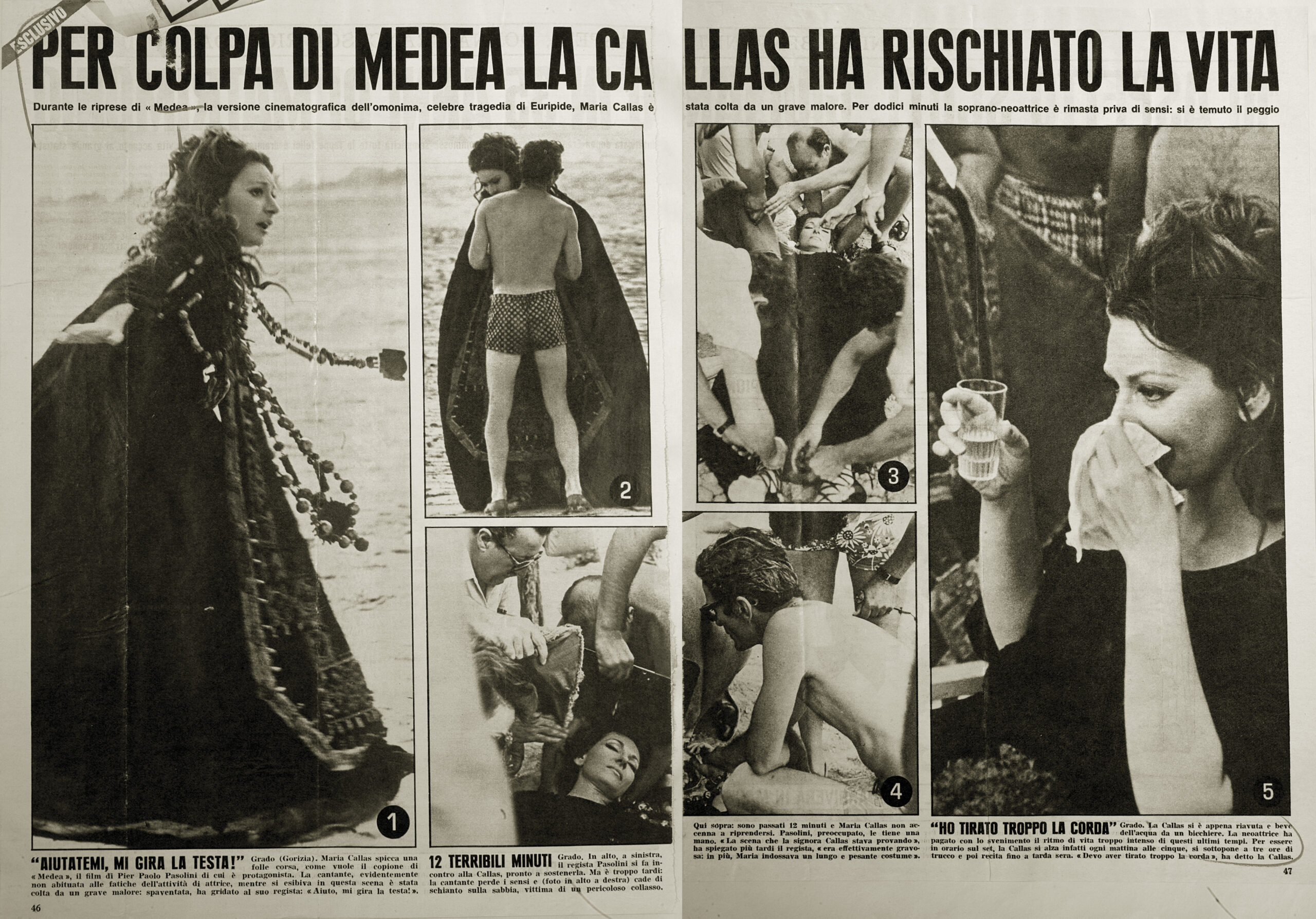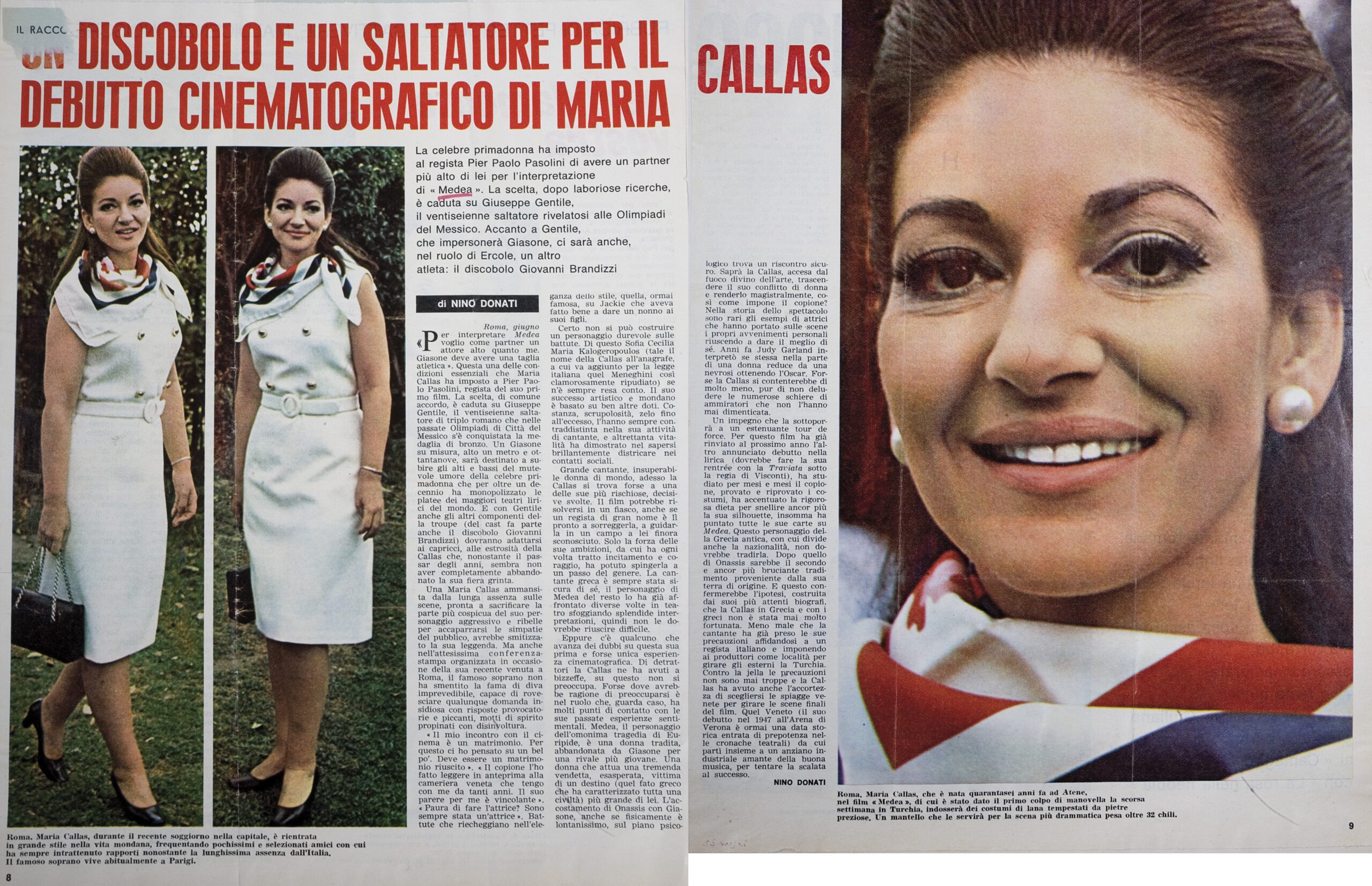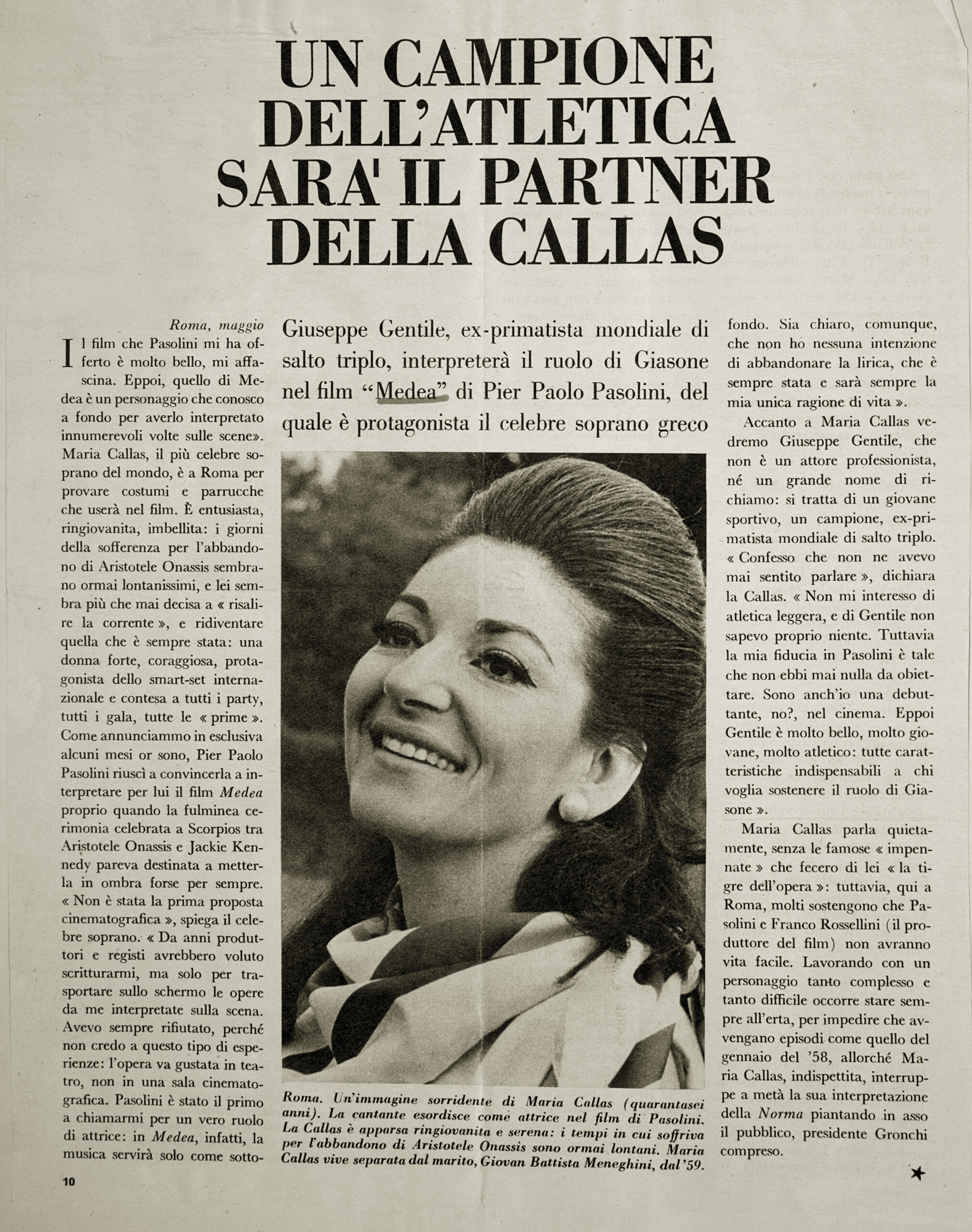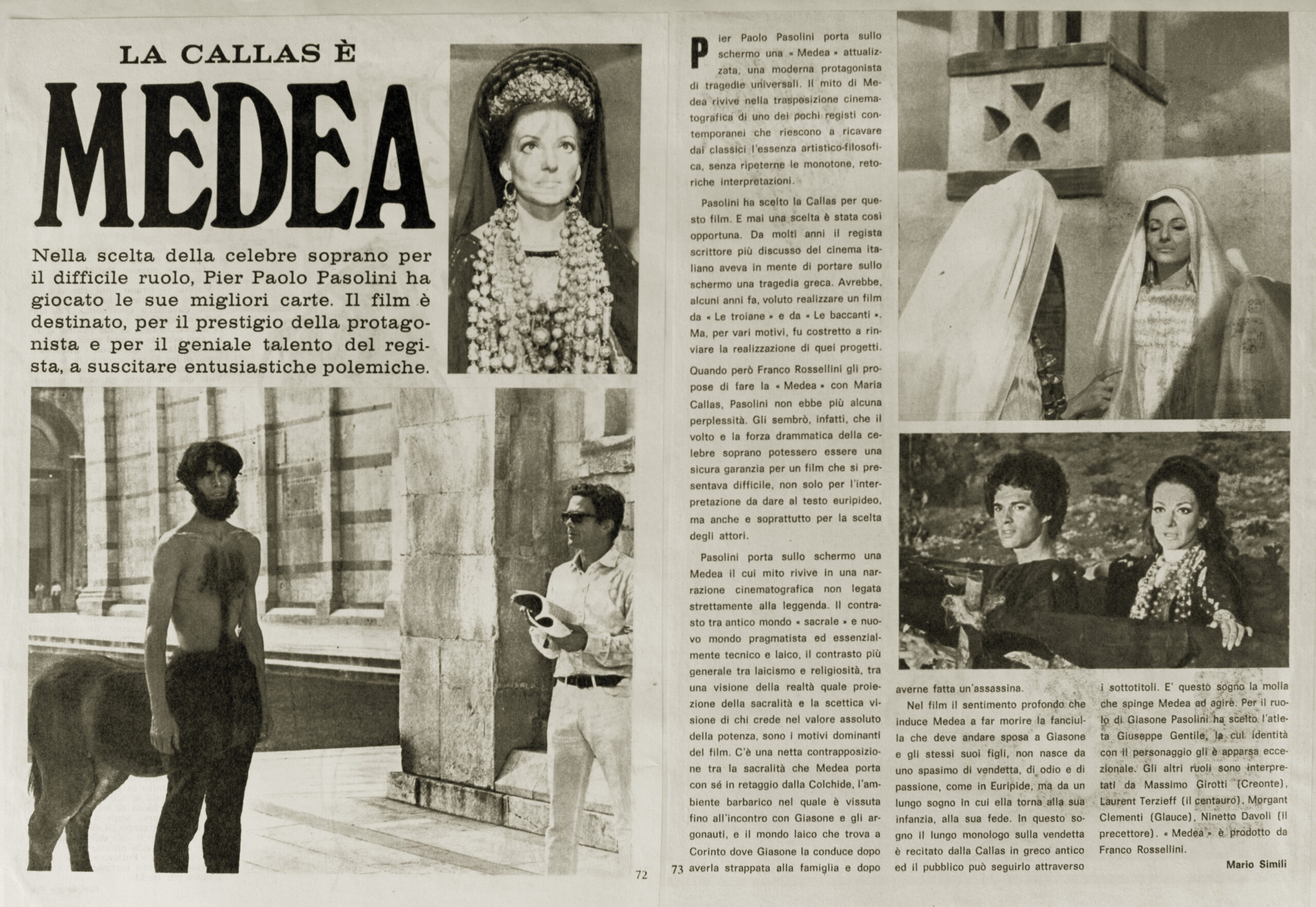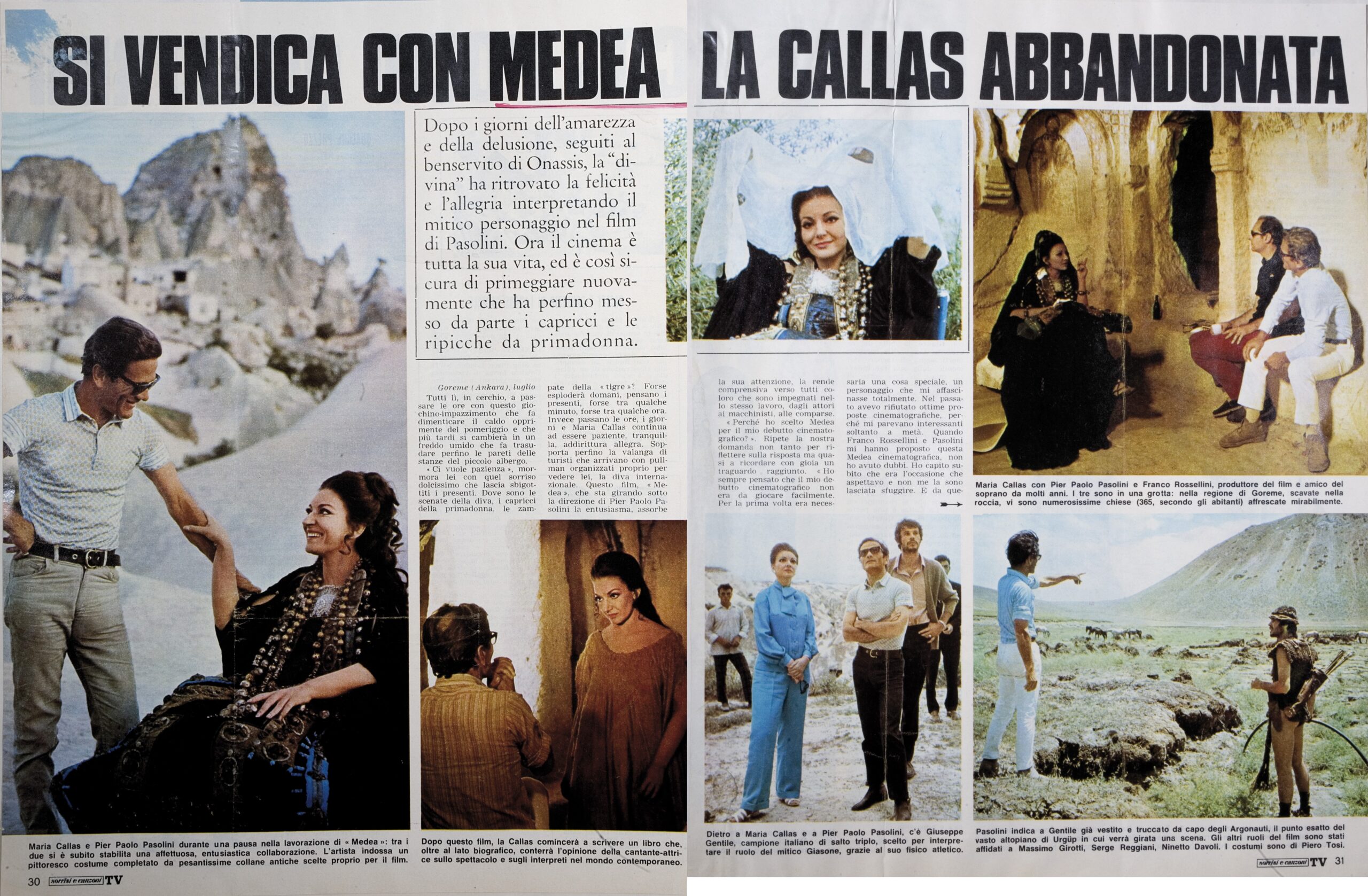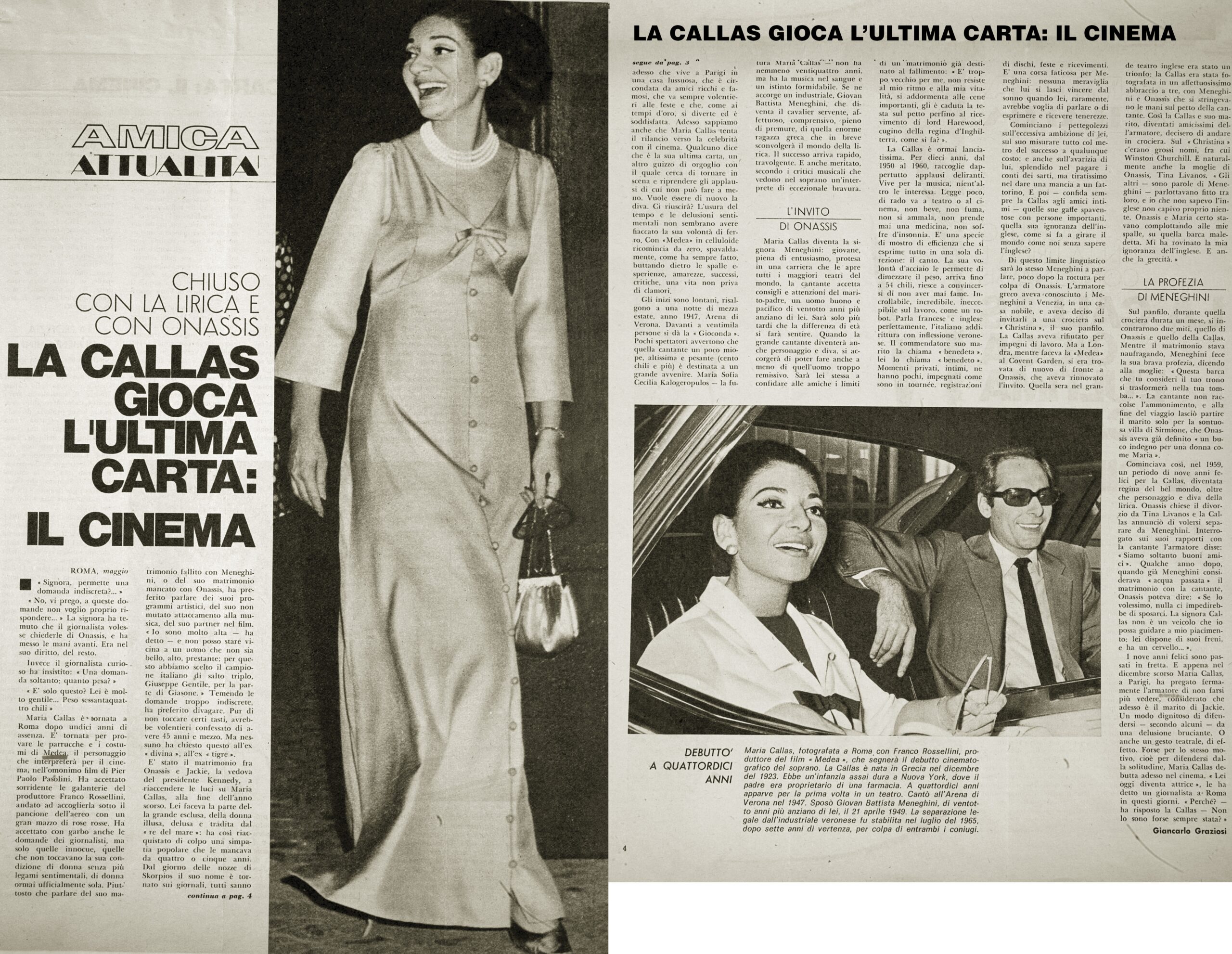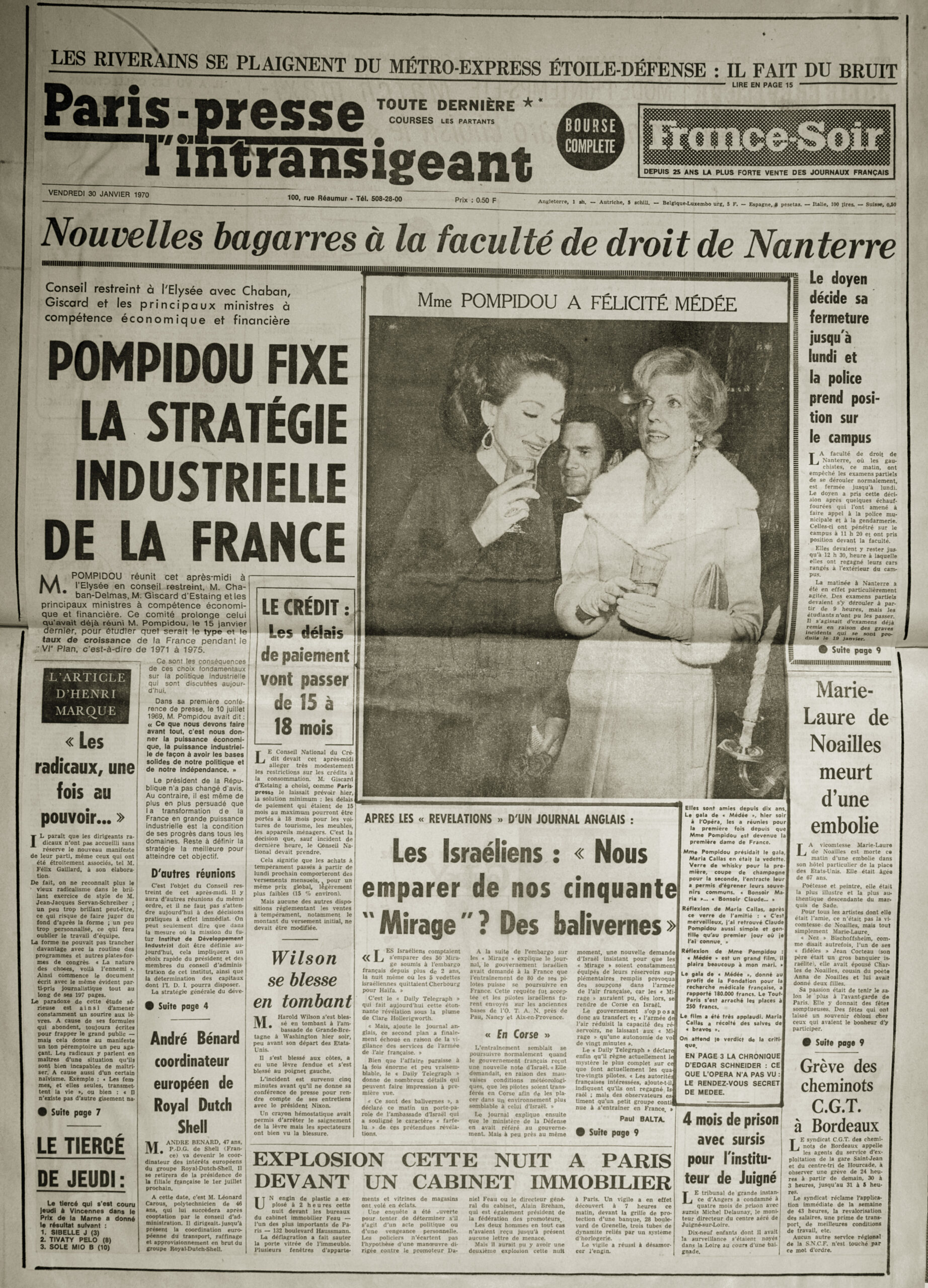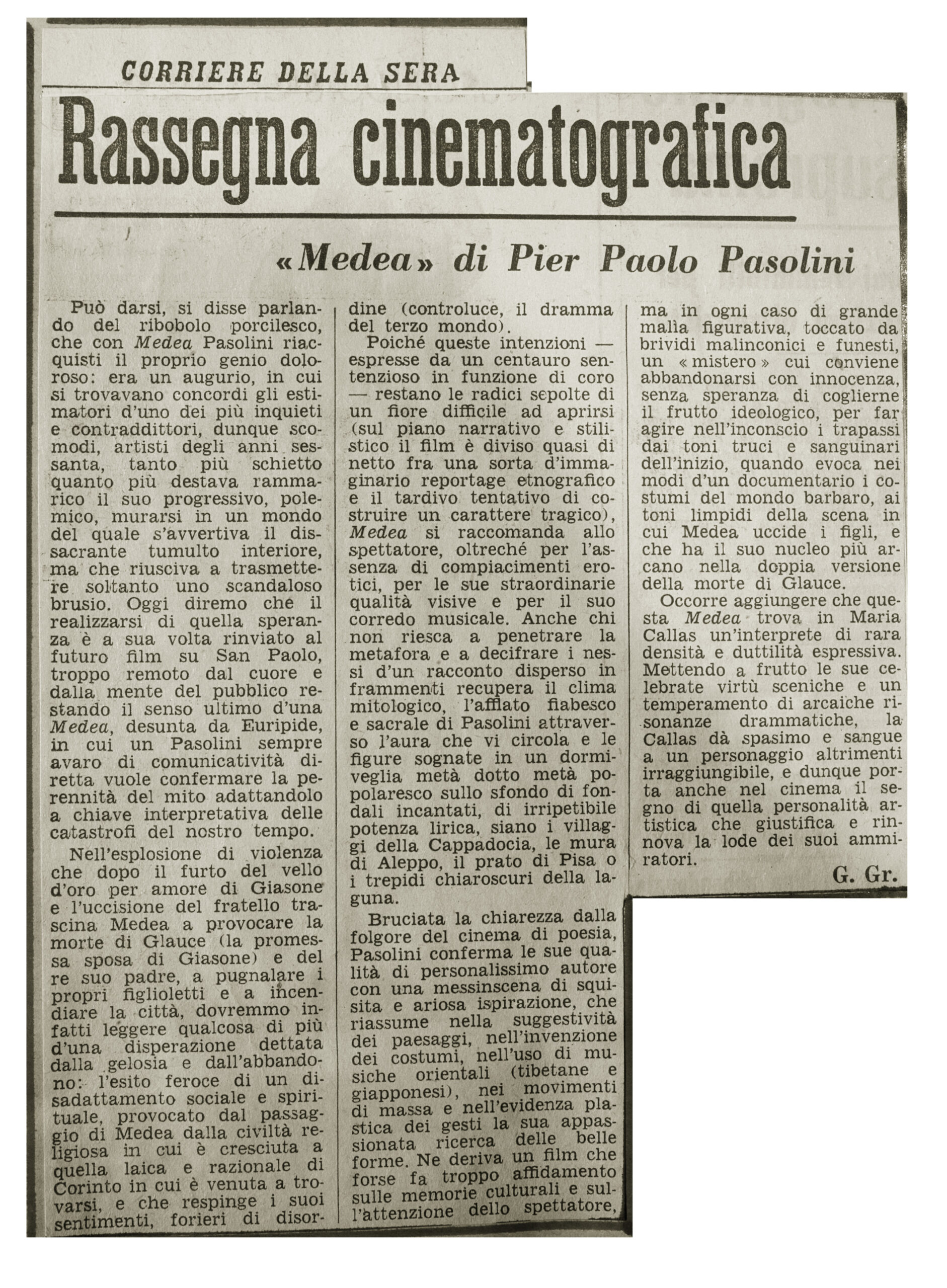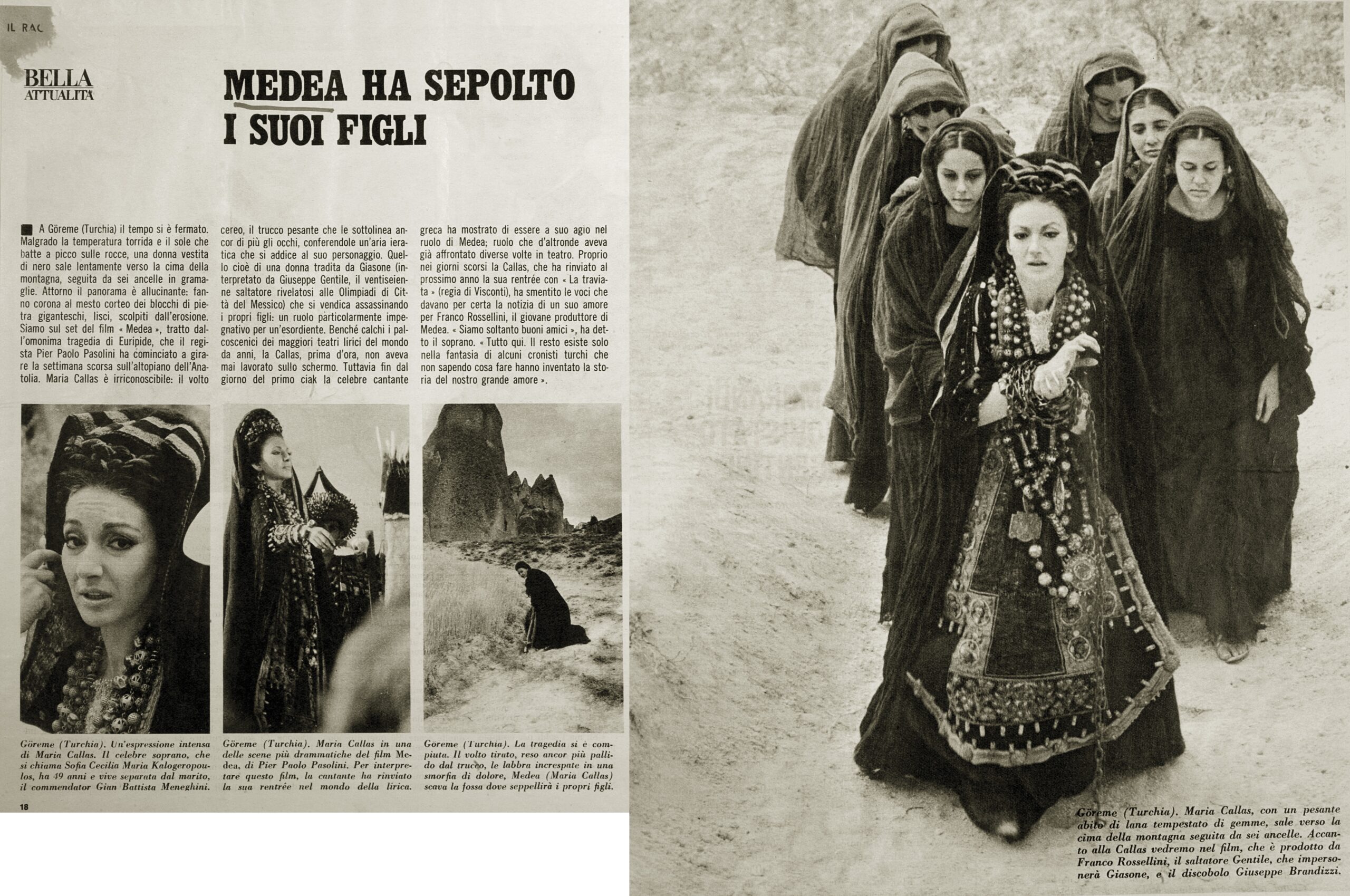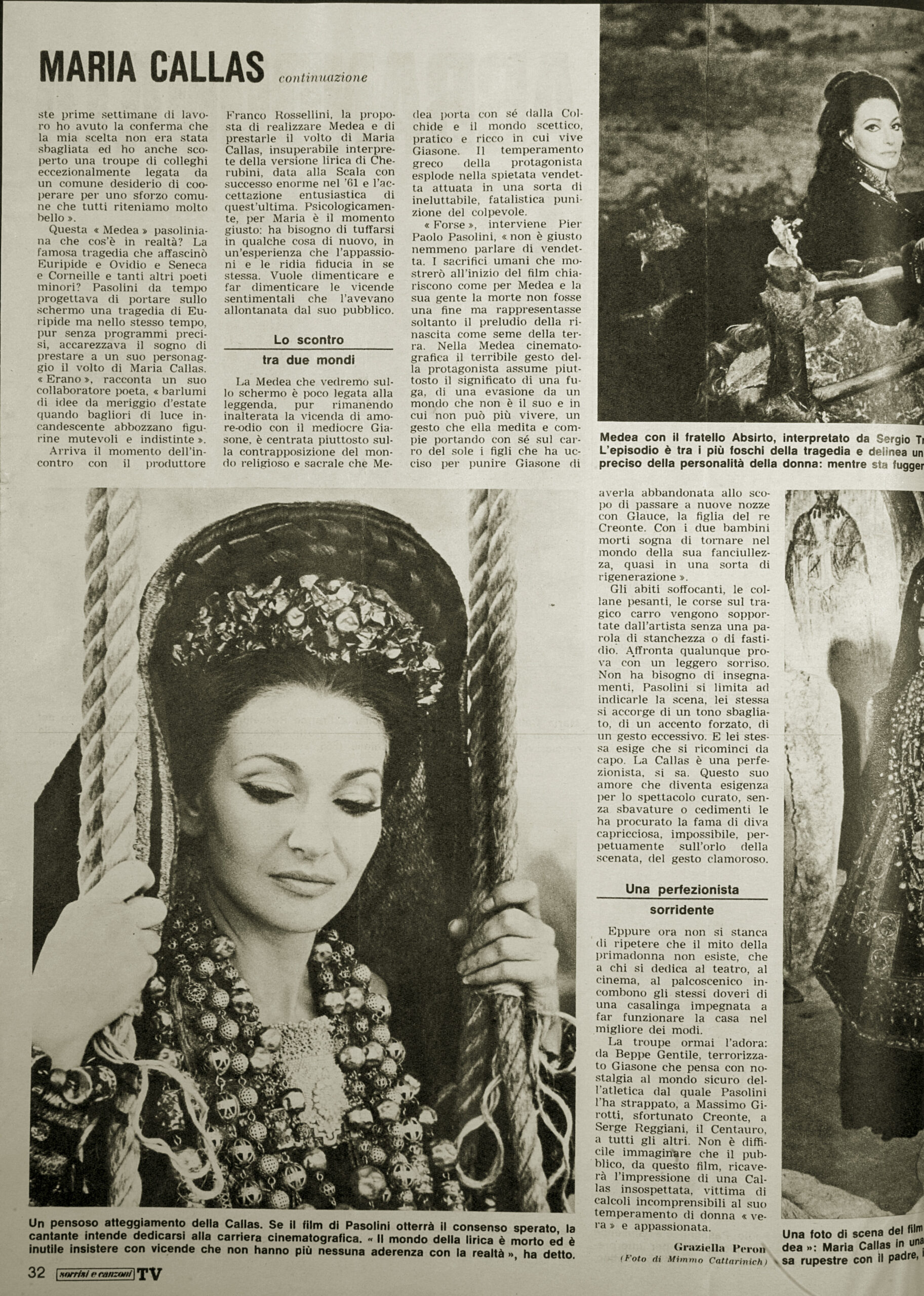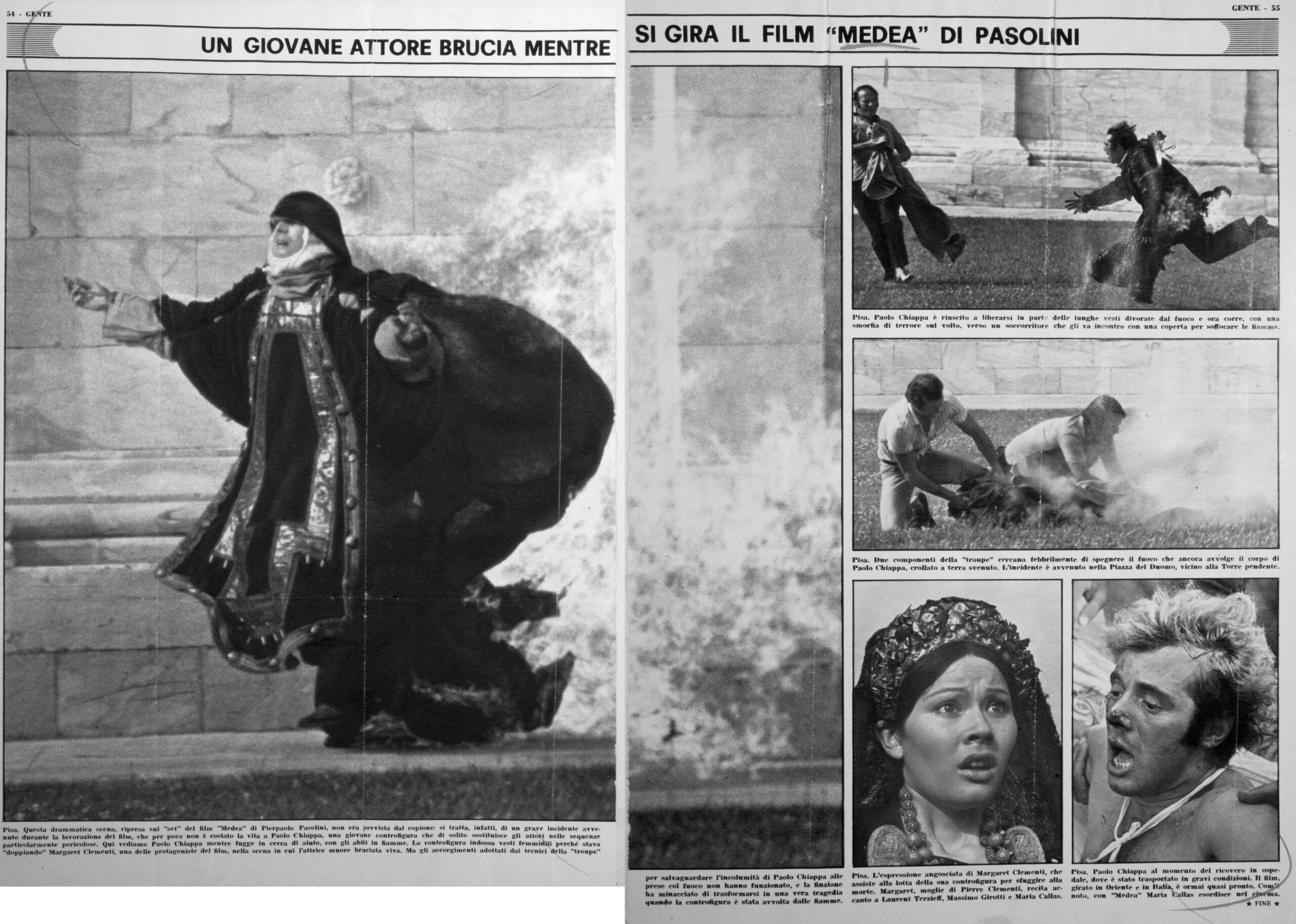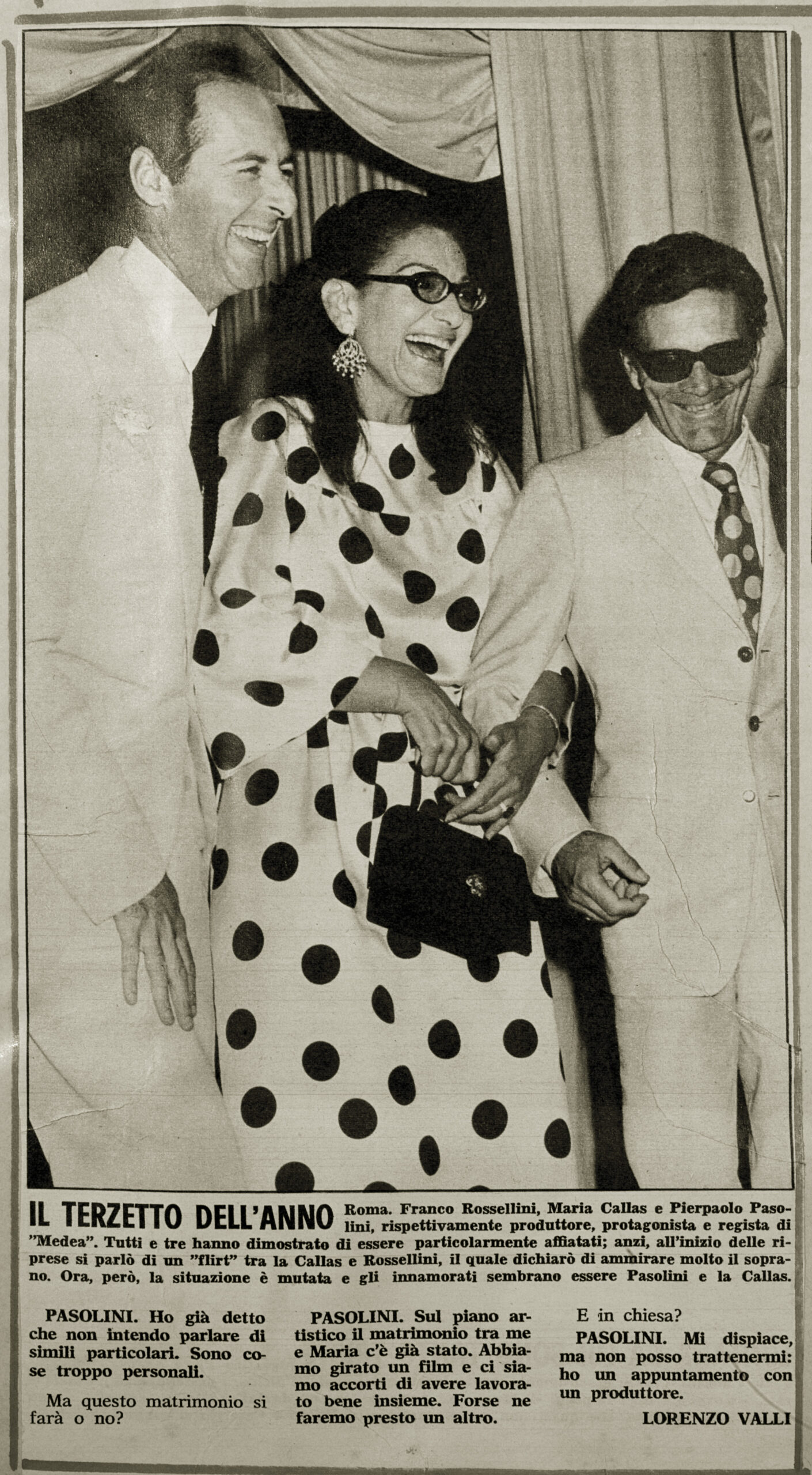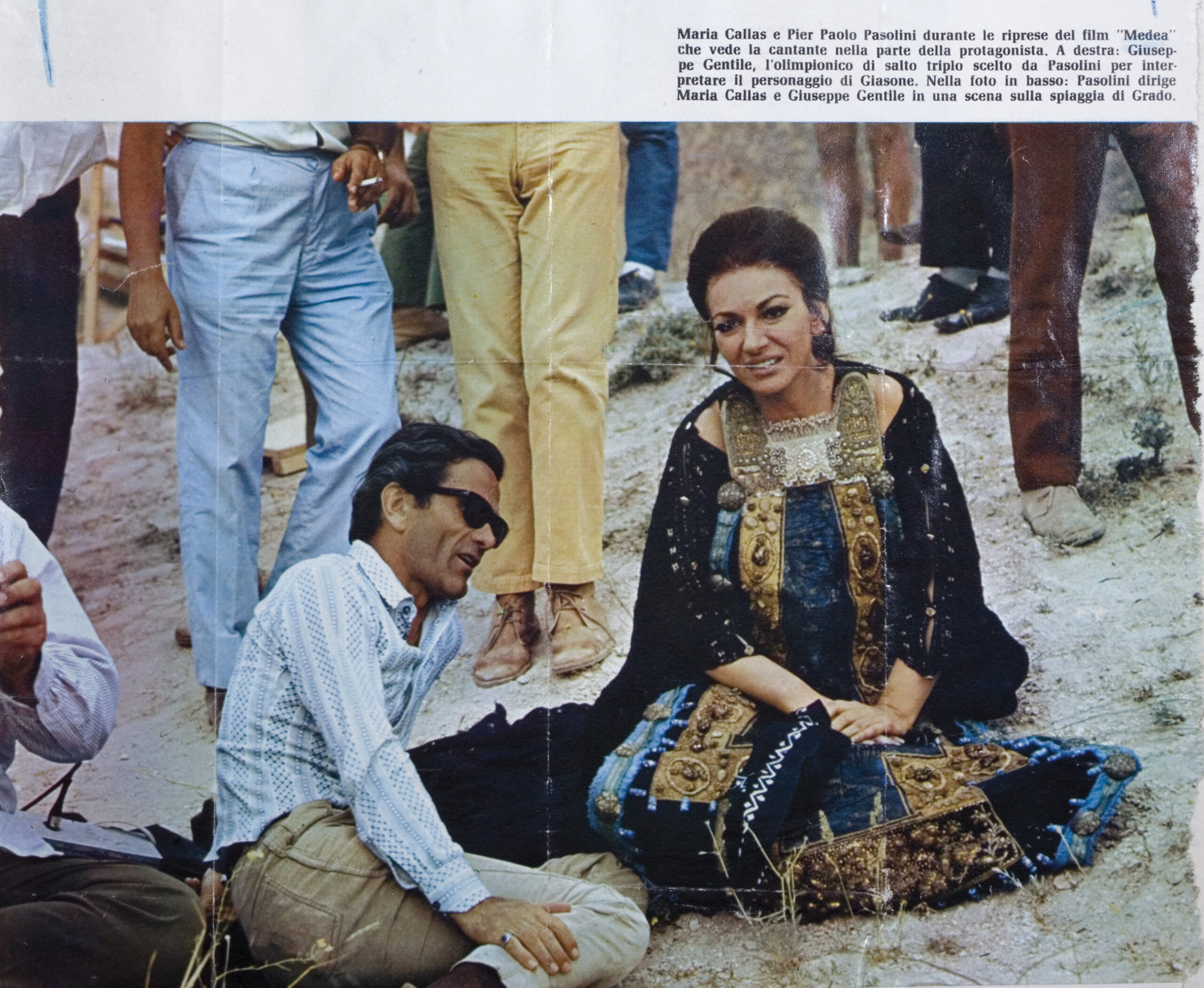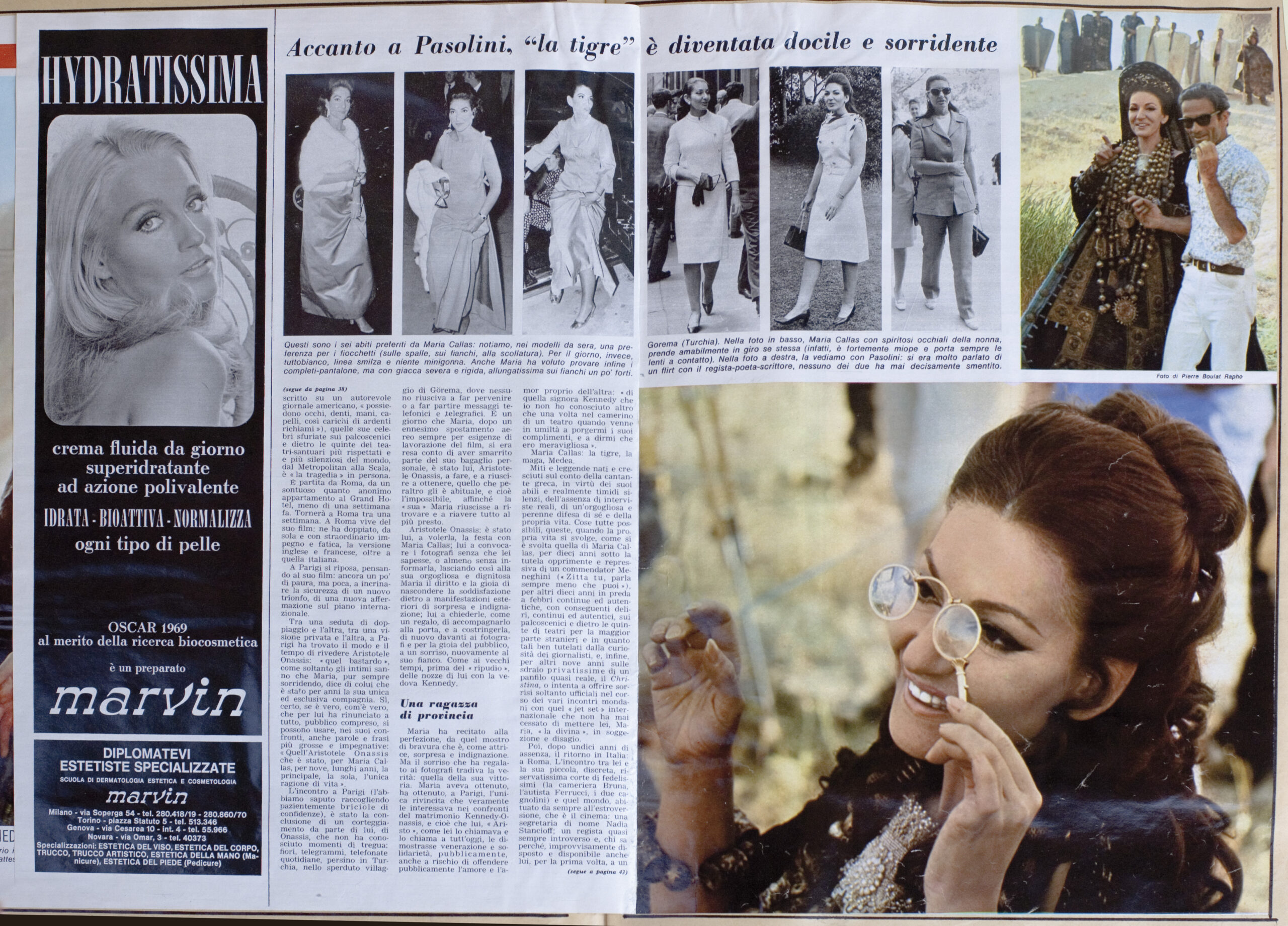The Library pays tribute to Maria Callas and Pier Paolo Pasolini with an exhibit of images drawn from a prized collection from the periodicals section regarding Pasolini’s film Medea, which was produced by San Marco film company, owned by director and film producer Franco Rossellini. The documents, which were donated to the Centro Sperimentale di Cinematografia in 2005, have been examined and described in the publication Medea di Pasolini. Cronache del tempo e ricordi dei protagonisti [1], part of the “Quaderni della Biblioteca Luigi Chiarini” series.
At the time, movie production companies’ press offices collected and archived articles and other newspaper and magazine clippings to gather information that would allow them to monitor press coverage and audience appeal, in order to achieve a better targeted promotional activity and distribution. This sizable collection holds historical value in that it bears evidence of the events surrounding the promotion of the film as well as the customs of the time, documenting various stages, from the promotional activity prior to the film’s theatrical release and the inception of the cult status earned by the actors, to the cultural debate on the movie’s aesthetic and intellectual value and the personalities of its creators and protagonists.
The three volumes of press clippings on Pasolini’s film Medea form the largest nucleus of the printed material donated by Fiorella Mariani [2]. They consist of bound albums (45 x 35 cm) in which are filed press clippings, magazine issues and other documents – such as telegrams and business cards – that provide extensive background on the film and its twentieth-century legends, leading actress Maria Callas and director Pier Paolo Pasolini.
The articles within the three volumes, dating from January 29th, 1969 to November 9th, 1971, are taken from major Italian newspapers, ranging from those with national circulation such as «Corriere della sera», «La Stampa» and «l’Unità», to local ones such as «Il Giornale di Sicilia», «Messaggero Veneto», «La Gazzetta di Ferrara», as well as major foreign newspapers like «Le Figaro», «Observer Review», «El Alcázar», «O Globo», and less common publications such as «Lo Specchio», «ABC», «Il Telegrafo», «Il Lavoro nuovo». There is also a significant amount of material from weekly news magazines, such as «Panorama» and «L’Espresso», and tabloids and more popular magazines such as «Gente», «Oggi», «Amica», «Annabella», «Eva» and «Novella».
The Gioia Fiorella Mariani collection includes both press cuttings and a photo collection. It is stored in relation to the specific nature of its media – paper or photography – at the appropriate departments of the Foundation.
The periodicals nucleus, which is part of the holdings of the “Luigi Chiarini” Library, consists of six hardbound volumes containing clippings – from newspapers, weekly magazines, and specialized periodicals published in Italy and abroad – pertaining to a total of four films by Franco Rossellini realized at various times in his career. The films, arranged in chronological order, are: Teorema (1968), Medea (1969), Decameron (1971), directed by Pasolini, and The Driver’s Seat (1974), best known as Identikit, directed by Giuseppe Patroni Griffi.
The photo collection – almost entirely related to the film Medea directed by Pier Paolo Pasolini in 1969 – consists of negatives and prints, including numerous contact prints, both black-and-white and color. The collection, housed at the CSC Photographic Archive, includes film stills, indoor and outdoor set photos taken during filming and crew breaks, and some photos intended for the film’s launch campaign. Most of the photographic material was taken by the on-set accredited photographer Mario Tursi, as indicated by the stamp on the reverse side of the prints.
[1] LUIGI CHIARINI LIBRARY Medea di Pasolini. Cronache del tempo e ricordi dei protagonisti. Centro Sperimentale di Cinematografia. Roma, 2006 (Quaderno designed and produced by Laura Ceccarelli and Marina Cipriani). Available at the Library and for sale on our Bookshop.
[2] Gioia Fiorella Mariani, set designer, costume designer, script supervisor, film director, daughter of Marcella Rossellini and sister to Roberto and Renzo Rossellini, after attending the Academy of Fine Arts, began working as an assistant to painter and set designer Lila De Nobili and director Franco Zeffirelli. After a long career in prose and opera theater across Italy, France, England, the United States and Japan, she directed artistic and biographical films and documentaries and was involved in the organization of the Festival dei due Mondi in Spoleto; she also curated numerous book projects.
MEDEA (1969) FILM INFO
Written and directed by: Pier Paolo Pasolini, inspired by Euripides’ Medea; cinematographer: Ennio Guarnieri; set designer and decorator: Dante Ferretti; architect: Nicola Tamburro (CSC); costumes: Piero Tosi (costumes created by Tirelli tailor shop and jewellery by Ditta Nino Lembo); assistant costume designers: Gabriella Pescucci, Piero Cicoletti; musical commentary: chosen by Pier Paolo Pasolini with the collaboration of Elsa Morante (Bixio S.A.M. records); sound technician: Carlo Tarchi; editing: Nino Baragli; directing collaboration: Sergio Citti; assistant director: Carlo Carunchio; camera operator: Sergio Salvati; assistant operators: Giorgio Urbinelli, Pasquale Rachini; makeup artist: Romolo Sensoli; makeup artist for Maria Callas: Goffredo Rocchetti (wigs by Ditta Rocchetti); hairstylist: Marcella De Marzi; hairstylist for Maria Callas: Maria Teresa Corridoni; set photographer: Mario Tursi; production manager: Fernando Franchi; production inspector: Sergio Galiano, Piero Nardi; production supervisor: Paolo Luciani; script supervisor: Beatrice Banfi; press office: [Enrico] Lucherini-[Margherita] Rossetti-[Matteo] Spinola.
Actors and characters: Maria Callas (Medea); Giuseppe Gentile (Jason); Laurent Terzieff (the centaur Chiron); Massimo Girotti (Creon); Margareth Clementi (Glauce), Sergio Tramonti (Apsirto), Anna Maria Chio (wet-nurse); Luigi Barbini (an argonaut); Paul Jabara (Pelias). Also: Gerard Weiss; Gian Paolo Duregon; Luigi Masironi; Michelangelo Masironi; Gianni Brandizi; Franco Jacobby; Piera degli Esposti; Gabriella Chiarcossi; Mirella Panfili (CSC); Maria Cumani Quasimodo; Giorgio Trombetti.
Production: San Marco S.p.a. Roma (Italy), Les Films Number One, Paris (France) and Janus Film und Fernsehen, Frankfurt am Main (West Germany); producers: Franco Rossellini, Marina Cicogna; associate producers: Pierre Kalfon, Klaus Helwig; film: Kodak Eastmancolor; 35 mm, color; camera: Arriflex; development and print: Technostampa; synch: NIS Film; distribution: Euro International Films. Filming: May-August 1969; sound stage: Cinecittà; locations: Turkey, Syria, Pisa, Marechiaro di Anzio, the Lagoon of Grado (Ludri and San Giuliano islands and on the shore of Banco d’Orio), Viterbo environs; first public screening: December 28th, 1969; censorship approval No.55222 of December 27th, 1969
Running time: 110 minutes and 28 seconds.
Data from:
Titoli di testa in Medea: un film di Pier Paolo Pasolini, Milano, Garzanti, 1970 pp.151-153;
POPPI, Roberto, PECORARI, Mario, Dizionario del cinema italiano. I Film, vol.3, dal 1960 al 1969, Gremese, Roma, 1992, pp. 326-327;
BERNARDINI, Aldo (edited by), Il cinema sonoro, 1930-1969, Anica, Roma, 1992, p.447;
Pier Paolo Pasolini “…con le armi della poesia”, Napoli, 15 ottobre-20 novembre 1994, L.A.N, [Napoli], 1994, p. 49.
Reproduction in any medium, even partial, of the images shown is forbidden

 Login
Login Chart
Chart








